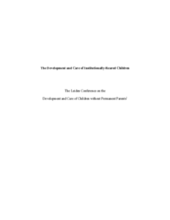This article briefly summarizes the literature on elements of research, practice, and policy pertaining to the development and care of children raised in institutions. It covers such children’s development while they reside in institutions and after their transition to adoptive or foster families. Of special interest are attachment and indiscriminate friendliness, physical growth, neurobiological deficits, and sensitive periods. Early exposure of a year or 2 to a substandard institution is related to higher than expected rates of a variety of long-term neurological, physical, cognitive, and behavioral deficiencies and problems, even if the children are subsequently reared in advantaged families. Countries hoping to transition from a reliance on institutions to family care alternatives face a variety of unique challenges relating to their prevailing historical, cultural, political, and financial circumstances. Although there has been progress, developing a child welfare system of family alternatives may take time in some countries.
©Leiden Conference sponsored by SRCD, Institute for the Study of Education and Human Development (The Netherlands), the Rommert Casimir Institute for Developmental Psychopathology, the NWO Spinoza Prize (to M. H. van IJzendoorn), Leiden University, and The Philip and Amy Goldman Foundation

